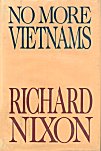NIXON : No more Vietnams (fülszöveg)
Since the Viemam War ended in 1975 many Amerieans, relieved at having this searing, disruptive experience behind them, have avoided thinking deeply and critically about it. In the ensuing intelleetual vacuum a variety of myths about Vietnam – our motives, our actions, our failures, our successes – have taken hold. Their combined effect, says our thirty-seventh president, has been a paralyzing Vietnam syndrome that he believes has prevented the United States from playing its proper role on the international stage.
In writing No More Vietnams, Richard Nixon – with the unique perspective of the man who served as Ameriea's commander-in-chief during the war's most difficult stage – has set out to dispel the myths of Vietnam, to show why we failed in Vietnam, and to contribute to the development of policies that will help avoid such failures in the future. In doing so, President Nixon analyzes the role that four presidents, the military, the Congress, the media, and the antiwar movement played in the Vietnam debacle.
This book is a comprehensive history of our longest war by one of the men who made that history. Richard Nixon participated in President Eisenhower's councils at the tune of Dien Bien Phu in 1954; made the difficult decisions to attack communist sanctuaries in Cambodia in 1970 and to bomb Hanoi in 1972; and concluded the Paris Peace Accords, which ended our involvement in the war and brought home our POWs, in 1973. In this book he combines an acute understanding of the history of the entire period with the kind of insight that can only come from having been personally involved in eritical decisions and great events.
But No More Vietnams is more than a review of a sad, painful page in American history. President Nixon also looks forward by outlining a strategy for the United States in what he calls the "Third World War" – the high-stakes ideological clash now under way in the developing world between the West on the one hand and the Soviet Union and its proxies on the other. Military power, and the willingness to use it if necessary in the defense of freedom, are important as peets of this strategy, but by no means the only ones. He urges the United States and its allies to marshal their economic, cultural, and creative resources in a massive effort to share the means of their prosperity with the developing world. Only by offering these struggling people more than a sterile choice between the status quo and communism, writes Richard Nixon, can we avoid more Vietnams.
|
|

|
|
| KATALÓGUS | TARTALOM |